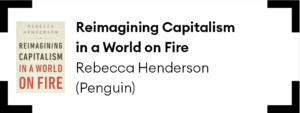A world on fire demands that we reimagine capitalism
There is a growing sense that the 2020s will be the decade when climate change policies really bite. In November 2021, the COP26 climate change conference will take place in Scotland. Important international agreements are expected. They may have major implications for sectors as diverse as energy, agriculture and the manufacturing supply chain, creating both existential risks and big opportunities for businesses.
In fact, the challenges we face in environmental degradation, economic inequality and institutional collapse are so great that business must be radically transformed. So argues Rebecca Henderson, a change consultant and professor at Harvard Business School, in Reimagining Capitalism in a World on Fire. Drawing on two decades of research into organizational change, political theory and in-depth case studies, she engagingly sets out an agenda for a reformed, socially responsible version of business leadership.
For too long, says Henderson, businesses have been given a free ride. They are not paying for the true costs of the damage they do to the environment, whether by burning carbon, degrading topsoil, using up the water supply or destroying insect populations. She is a strong supporter of the principle that ‘the polluter must pay’ and of government regulation to enforce that.
The climate crisis is not the only problem we face. Henderson argues that in countries like the USA, the living standards of millions are threatened by the gig economy and the rise of AI. Policies such as more generous minimum wages are, while expensive, essential. She regards the rise of populism as a threat to democracy and urges businesses to take a bi-partisan approach to promoting democratic participation, for example by encouraging voter registration.
Henderson writes that purpose-driven businesses that combine a social mission with the pursuit of profit are challenging to run but can outperform competitors. They tend to have high levels of employee engagement, productivity and profitability. Their leaders are more willing to change the business architecture radically: in a period of rapid change, that can position them ahead of rivals. For example, car manufacturers that did not invest in electric cars early enough may struggle to survive, while Tesla’s future looks bright.
That said, what about the duty of management to maximize returns for investors? What about the pressure on the leaders if their company’s share price dips? Purpose-driven business change can be expensive and, in the short term, unprofitable. Henderson says investors are right to be cautious about companies that miss their targets: it is often, she says, a sign of problems with the management. But look at examples such as Amazon, which famously didn’t turn a profit for years, yet maintained investor confidence. Investors will accept long-term payoffs if they understand the strategy and have good information on performance. In this respect, the development of robust environmental, social and governance (ESG) indicators which correlate to financial performance is promising. They will be key to a reinvented capitalism.
A cynic might ask: “Isn’t this just a clever survival strategy for the fat cats running big companies?” After all, green or socially responsible business practices make sense to Fortune 500 consumer businesses, when so much of their value is tied up in their brand. For the chief executive class, ‘ethical business’ is just a form of insurance to preserve their privileged positions.
Perhaps, but nonetheless, that still adds up to a compelling reason for business to change. In his novel The Leopard, Giuseppe Tomasi di Lampedusa wrote: “Everything needs to change, so everything can stay the same.” Maybe an understanding that the world is on fire – and that customers will not put up with businesses which do nothing to extinguish the flames – is exactly what is required.
Piers Cain is a management consultant.


